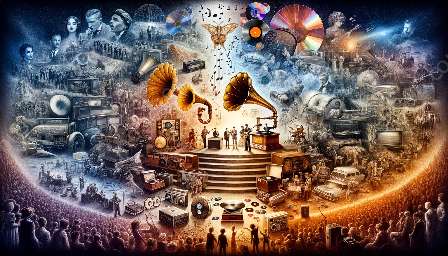The relationship between radio and the music industry is a dynamic and deeply interconnected one, with radio serving as a powerful force in shaping the social and cultural landscapes of music and vice versa. This discussion will delve into the multifaceted influences of radio on the music industry, the role of radio, and its profound impact on the music business.
Social and Cultural Influences of Radio on the Music Industry
Radio has long been recognized as a significant influencer in shaping the social and cultural landscape of the music industry. It has the power to introduce new music to a wide audience, as well as to amplify the popularity of established artists and genres.
1. Discovery and Exposure
One of the most crucial social influences of radio on the music industry is its ability to serve as a platform for music discovery and exposure. Radio stations, through curated playlists and DJ selections, play a pivotal role in introducing audiences to new artists and emerging genres.
By featuring diverse and innovative music, radio has the capacity to influence societal tastes and preferences, potentially leading to the widespread adoption of specific musical styles or trends.
2. Cultural Preservation and Innovation
Furthermore, radio functions as a means of cultural preservation and innovation within the music industry. It can be a platform for the celebration and dissemination of traditional and heritage music, supporting cultural diversity and inclusivity.
On the other hand, radio also serves as a catalyst for musical innovation, providing a space for artists to experiment with new sounds and styles, driving cultural evolution and progression within the industry.
The Role of Radio in the Music Industry
Understanding the role of radio in the music industry is essential to grasp the significance of its social and cultural influences. Radio plays multiple key roles that contribute to shaping the landscape of the music industry.
1. Music Promotion and Exposure
As a primary platform for music promotion, radio aids in providing exposure to artists, enabling them to reach a vast and diverse audience. It serves as a powerful tool for launching new music into the public sphere and fostering the growth of emerging talent.
Furthermore, radio airplay can significantly impact an artist's visibility, leading to increased album and ticket sales, as well as influencing streaming numbers, thereby driving financial success within the music business.
2. Gatekeeping and Trendsetting
Radio stations often act as gatekeepers, influencing the public's perception of what is considered popular and trending within the music industry. By curating playlists and determining the frequency of song rotation, radio wields substantial influence over audience preferences and consumption patterns.
This trendsetting ability holds immense power in dictating the commercial success of artists and albums, with radio airplay often serving as a barometer for mainstream popularity.
Impact of Radio on the Music Business
Radio's impact on the music business extends beyond its role in societal and cultural influences, encompassing significant implications for the industry's financial and operational aspects.
1. Revenue Generation and Market Dynamics
Radio airplay directly influences the revenue generation and market dynamics of the music industry. Successful exposure on radio can lead to increased album and merchandise sales, as well as higher demand for concert tickets and live performances.
Additionally, radio-driven popularity can impact an artist's bargaining power in negotiating deals with record labels, distributors, and concert promoters, ultimately influencing their financial success within the industry.
2. Industry Trends and Commercial Viability
The patterns and trends set by radio play a crucial role in determining the commercial viability of different music genres, styles, and artists. By shaping audience preferences and driving mass consumption, radio contributes to the perpetuation of specific industry trends and the commercial success of particular musical works.
Moreover, the influence of radio on industry trends can also impact the strategic decisions of music labels and artists, guiding their creative and promotional endeavors to align with prevailing market demands and preferences.
In Conclusion
The intricate web of connections between radio and the music industry illustrates the depth of their mutual influences. Radio serves as a dynamic and pervasive force, shaping societal attitudes, cultural expressions, and commercial dynamics within the music industry. By understanding and appreciating the complexities of these influences, stakeholders in the music business can harness the power of radio to navigate the ever-evolving terrain of the music industry.









































